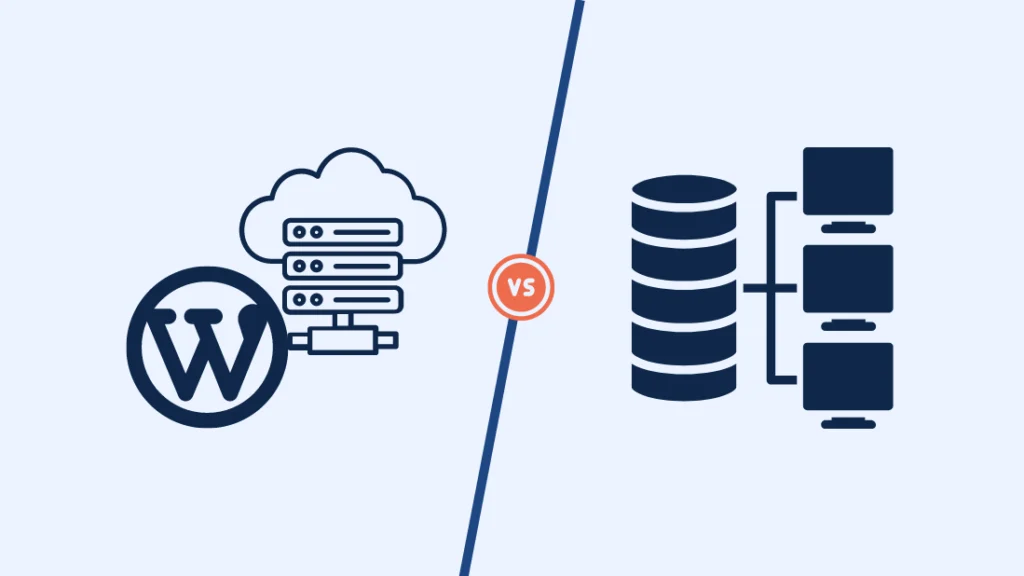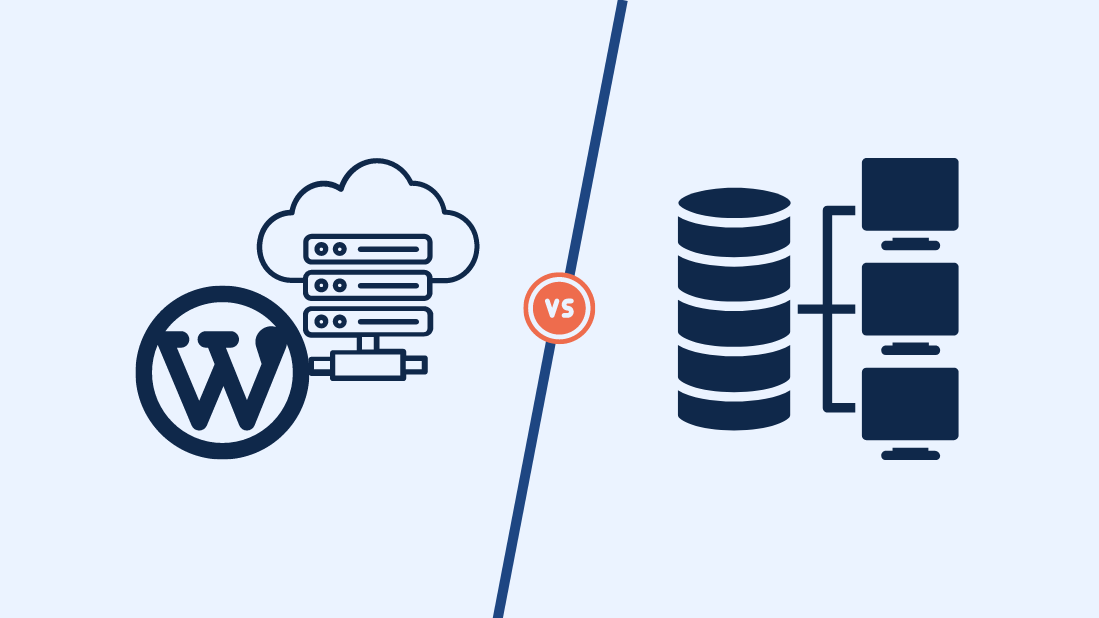Choosing the right web hosting solution is a critical decision for anyone looking to establish an online presence. Your website’s performance, security, and scalability largely depend on the hosting environment you select. Two popular options often considered are WordPress hosting vs shared hosting.
While both serve the fundamental purpose of making your website accessible online, they offer distinct features and benefits. Understanding these key differences is crucial to making an informed choice that aligns with your website’s specific requirements.
Table of Contents
ToggleWhat is Shared Hosting?

Shared hosting is the most common and often the most affordable type of web hosting. In this setup, your website shares server resources with numerous other websites. Think of it like living in an apartment building: you have your own unit, but you share the building’s infrastructure (like electricity and water) with other residents.
How Shared Hosting Works
With shared hosting, a single physical server hosts hundreds, or even thousands, of websites. All these websites share the server’s CPU, RAM, disk space, and bandwidth. The hosting provider manages all server maintenance, security updates, and technical aspects, making it an attractive option for beginners and small websites.
Advantages of Shared Hosting
- Cost-Effective: It’s the cheapest hosting option available, making it ideal for individuals, small businesses, or hobbyists with limited budgets.
- Ease of Use: Most shared hosting plans come with user-friendly control panels (like cPanel) that allow for easy website management, domain setup, and email account creation.
- Low Maintenance: The hosting provider handles all server management, patching, and security, freeing you from technical responsibilities.
Disadvantages of Shared Hosting
- Resource Limitations: Since resources are shared, a sudden traffic surge or resource-intensive website on the same server can negatively impact your website’s performance, leading to slower loading times or even downtime. This is often referred to as the “bad neighbor effect.”
- Security Concerns: While providers implement security measures, the shared nature of the server means a security vulnerability on one website could potentially affect others on the same server.
- Limited Scalability: As your website grows and requires more resources, shared hosting can become a bottleneck. Upgrading often means migrating to a different hosting type.
- Less Control: You have limited control over server configurations and software installations.
What is WordPress Hosting?

WordPress hosting is a specialized form of web hosting optimized specifically for WordPress websites. While it can technically be a type of shared hosting, it often comes with additional features and configurations tailored to enhance WordPress performance, security, and management. It can also be implemented on more powerful infrastructures like VPS or dedicated servers for larger, more demanding WordPress sites.
How WordPress Hosting Works
WordPress hosting environments are configured with settings, plugins, and caching mechanisms designed to make WordPress run at its best. This often includes:
- Pre-installed WordPress: Many providers offer one-click WordPress installation or even have WordPress pre-installed, simplifying the setup process.
- Optimized Servers: Servers are tuned with specific software and hardware configurations (like NGINX, PHP-FPM, or specific database optimizations) that improve WordPress speed and efficiency.
- Caching Solutions: Built-in caching at the server level or specific caching plugins are often integrated to serve content faster.
- Enhanced Security: WordPress hosting plans often include specialized security features like malware scanning, firewalls, and brute-force protection to defend against common WordPress vulnerabilities.
- Automatic Updates & Backups: Many providers offer automatic core WordPress updates, theme, and plugin updates, along with regular automated backups, ensuring your site is always up-to-date and protected.
- WordPress-Specific Support: Support teams are typically knowledgeable about WordPress-related issues, offering more targeted assistance.
Types of WordPress Hosting
WordPress hosting can broadly fall into a few categories:
- Shared WordPress Hosting: This is essentially shared hosting with WordPress-specific optimizations. It’s affordable but still shares resources.
- Managed WordPress Hosting: This is a premium service where the hosting provider takes care of virtually all technical aspects of your WordPress site, including updates, security, backups, and performance optimization. It’s more expensive but offers unparalleled convenience and performance.
- VPS WordPress Hosting: For larger sites, a Virtual Private Server (VPS) dedicated to WordPress offers more resources and control than shared hosting, without the cost of a dedicated server.
- Dedicated WordPress Hosting: The most powerful option, where your WordPress site has an entire physical server to itself, offering maximum performance and control.
Advantages of WordPress Hosting
- Optimized Performance: Faster loading times and better overall performance due to server configurations tailored for WordPress.
- Enhanced Security: Specialized security measures to protect against WordPress-specific threats.
- Ease of Management: Features like one-click installs, automatic updates, and staging environments simplify WordPress site management.
- Dedicated Support: Access to support teams with expertise in WordPress.
- Scalability: Many WordPress hosting plans offer clear upgrade paths as your website grows.
Disadvantages of WordPress Hosting
- Higher Cost: Generally more expensive than basic shared hosting, especially for managed WordPress hosting.
- Specific to WordPress: Designed solely for WordPress websites, making it unsuitable if you plan to use a different CMS or build a custom site.
- Less Control (for Managed): While convenient, managed WordPress hosting can limit your control over server configurations and certain plugins, as the provider aims to maintain an optimized and stable environment.
Also Read: Web Hosting vs WordPress Hosting : What’s the Difference?
WordPress Hosting vs Shared Hosting: A Side-by-Side Comparison

Let’s break down the key differences to help you decide:
|
Feature |
Shared Hosting | WordPress Hosting |
|
Cost |
Lower, budget-friendly |
Higher, offers more value and specialized features |
| Performance | Can be slower due to shared resources; “bad neighbor effect” |
Optimized for speed, faster loading times |
|
Security |
Basic server-level security; more vulnerable to shared risks | Enhanced, WordPress-specific security measures |
| Ease of Use | Easy with control panel, but requires some manual setup |
Very easy; often pre-installed, automatic updates, staging |
|
Management |
You manage most aspects of your website and software | Provider manages server, updates, backups, and security |
|
Scalability |
Limited; requires migration for significant growth | Easier to scale within the WordPress hosting ecosystem |
|
Control |
More control over server environment (within shared limits) |
Less control (especially for managed plans) due to optimizations |
| Target User | Beginners, small blogs, personal websites, static sites |
WordPress users, small to large businesses, e-commerce sites |
| Support | General hosting support |
Specialized WordPress expert support |
Which One Should You Choose?
The best hosting option depends entirely on your specific needs, budget, and technical expertise.
Choose Shared Hosting if:
- You’re on a tight budget: It’s the most economical starting point.
- You’re launching a small personal website or blog: If your traffic is expected to be low, shared hosting can suffice.
- You’re new to websites: Its simplicity and managed nature are great for beginners.
- You’re not using WordPress: If you plan to use another CMS or build a custom site from scratch.
Choose WordPress Hosting if:
- Your website runs on WordPress: It’s designed to make WordPress perform optimally.
- You prioritize performance and speed: Faster loading times improve user experience and SEO.
- You need enhanced security for your WordPress site: Specialized protections guard against WordPress-specific threats.
- You value convenience and automation: Automatic updates, backups, and staging environments save you time and effort.
- Your website is critical to your business or generates significant traffic: WordPress hosting provides a more robust and reliable environment.
- You want expert WordPress support: Access to knowledgeable support staff can be invaluable.
Conclusion
Both shared hosting and WordPress hosting offer viable solutions for getting your website online. While shared hosting is a fantastic entry point for budget-conscious individuals and small projects, WordPress hosting stands out as the superior choice for anyone committed to running a successful, high-performing WordPress website.
Its tailored optimizations for speed and security, coupled with features designed to simplify WordPress management, provide a distinct advantage. If you’re looking for a reliable, high-performance, and secure home for your WordPress website, consider Quape specialized WordPress Hosting solutions.
As a leading web hosting and domain company in Singapore, Quape understands the unique demands of WordPress and offers optimized environments designed to help your website thrive. Explore Quape WordPress Hosting plans today and experience the difference dedicated optimization makes!
- Subdomain vs Subdirectory: Which One Is Better for SEO? - August 8, 2025
- What Is Multiple Domain Hosting? Simple Explanation - August 7, 2025
- Top Benefits of Using Short Links for Your Website - August 6, 2025



